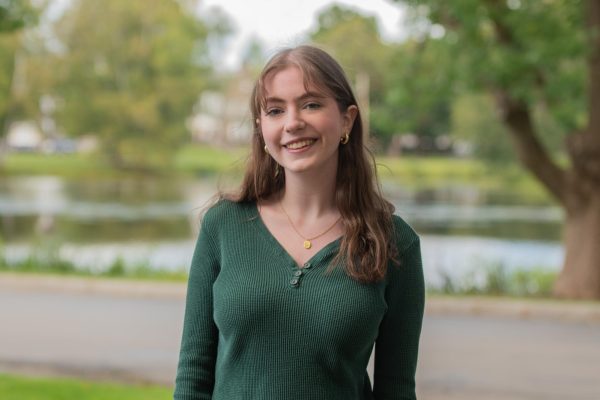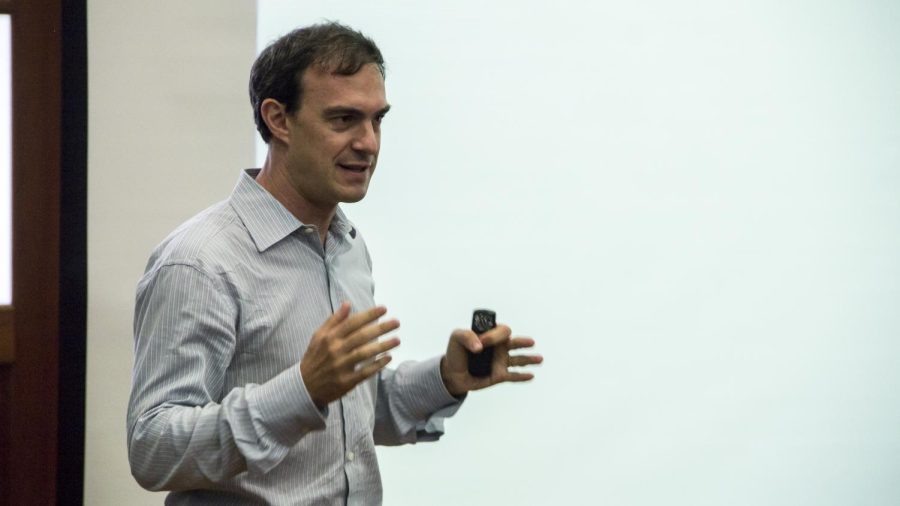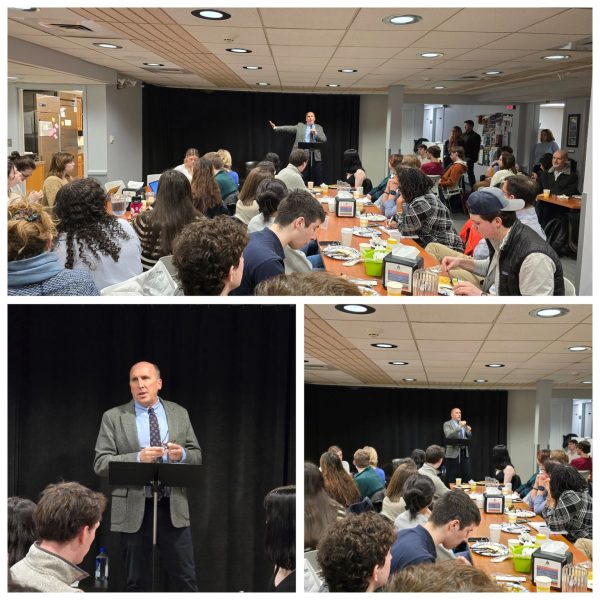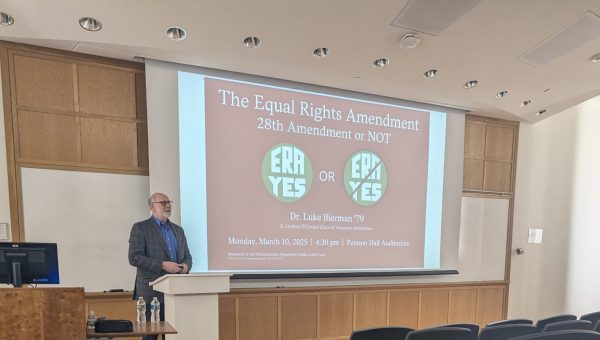Lampert Institute Hosts Lecture on ‘Disruptive Economics’ of AI
The Lampert Institute for Civic and Global Affairs at Colgate University welcomed Avi Goldfarb, professor of marketing and Rotman Chair in Artificial Intelligence and Healthcare at the University of Toronto, to give a lecture entitled “The Disruptive Economics of Artificial Intelligence” on Wednesday, March 22. Goldfarb is co-author of the book “Power and Prediction: The Disruptive Economics of Artificial Intelligence,” the topic which his lecture reflected. Copies of his book were available to the attendees, who filled the Persson Auditorium.
Illan Nam, director of the Lampert Institute and Associate Professor of Political Science, explained the Lampert Institute’s intentions in bringing Goldfarb to Colgate University. Nam emphasized the timely relevance of a lecture on artificial intelligence.
“Advances in AI are going to significantly disrupt our society and its institutions in manifold ways […]. It seemed a timely moment to invite an expert on AI to share his views on how AI will shape our futures,” Nam said.
Goldfarb’s lecture focused on the ways in which the growing world of artificial intelligence can disrupt current economic norms. The presentation highlighted the already-present economic transformations; for example, the use of artificial intelligence in GPS navigation and online shopping. Throughout his presentation, Goldfarb recognized the growing interest in AI in popular media and academia alike, acknowledging the growing interest in technologies like ChatGPT. Goldfarb emphasized the mathematical and economic realities behind AI, going into detail on statistics and prediction technology.
“Maybe we’re a little worried about our future AI overlords […]. Don’t think the machines from science fiction, think stats,” Goldfarb said.
Sophomore Dani Silverman attended the event because her Macroeconomics class read Goldfarb’s book. An Economics and English double major, Silverman was drawn to Goldfarb’s real-world examples of how AI systems have developed.
“When Professor Goldfarb began talking about how AI transformed taxis to Uber dominance, I was really intrigued — I had never thought about how AI has already started changing the way people live their lives,” Silverman said.
In his presentation, Goldfarb discussed a growing concern over AI and the labor market: the ability of AI to replicate human skills and replace jobs. He remarked that losing jobs is “terrifying,” but also that machines cannot always replace manpower.
“The reality is [that machines are] not able to do everything humans do,” Goldfarb said.
He also expressed that while retraining workers — whose jobs may be replaced by machines — is not the answer to labor concerns, AI could, nevertheless, open up a new market of jobs and opportunities.
“Because [the jobs] are new, they haven’t been invented yet,” Goldfarb said.
Goldfarb also researches healthcare and the growing connections between AI and the medical world. He emphasized that while AI can bring important innovations in healthcare, relying on AI across the board might be dangerous. He described how AI can affect more people with their mistakes than a doctor with a limited number of patients, for example.
A recurring theme of Goldfarb’s lecture was that artificial intelligence has the potential to radically transform the economy, but a lot of that transformation is still to come. To put where the world is with AI into perspective, Goldfarb compared the current state of AI to the beginnings of electricity. He described how there was a 40-year gap between the first patents for electricity and the common adoption of it — from the 1880s to the 1920s.
“[AI can] transform the way we live as electricity did,” Goldfarb said. “With AI, it feels like we’re in the 1880s. We can see the potential in technology, but we haven’t figured out what these new systems look like.”
To Goldfarb, the process of figuring out new systems — in which AI reaches its full potential — also entails asking ethical questions about AI versus human judgment. Goldfarb explained how AI decouples prediction (looking at statistical odds and outcomes of a scenario) and judgment (what to do with those statistics). Goldfarb expressed how the decoupling of prediction and judgment poses an “inconvenient” dynamic, as AI predictions take away the domination of human judgment in decision-making. Goldfarb described how there may be instances in which AI decisions are more effective and beneficial than human decisions but are uncomfortable or disagreeable.
“As long as we’re in a world of prediction machines, [judgment calls] remain inherently human,” Goldfarb said.
The lecture was followed by a Q&A session, in which students and faculty asked Goldfarb about topics from coding to ChatGPT to the labor market. Professor Nam commented on the energy of the Q&A session.
“The Q&A that followed this talk was one of the most animated and incisive that I’ve heard,” Nam said. “It went on for over 45 minutes. The topic clearly resonated with students.”
When asked what students should take away from the lecture, Goldfarb emphasized that a transformation brought about by AI will involve broad changes.
“The big impact of AI will come through system-level solutions that change the way people live and work,” Goldfarb said.
Silverman shared how she felt after the talk.
“I feel more prepared for the future and am excited to see where AI takes future human societies,” Silverman said.
Nam also shared her thoughts about the talk and commented on the relevance of AI for Colgate.
“With the advancement of tools such as ChatGPT, AI has prompted important questions on our campus,” Nam said. “How do we adjust to such developments? How will they change liberal arts education as we know it? Do we have to reevaluate the types of skills students need to learn? The talk made it clear that we need to engage with these pressing issues because advancements in AI are rapidly gaining and [are] going to reshape the way we do things.”

Rylee Hatch is a junior from East Fishkill, N.Y. concentrating in English with a minor in Medieval and Renaissance Studies. She has previously served as...







